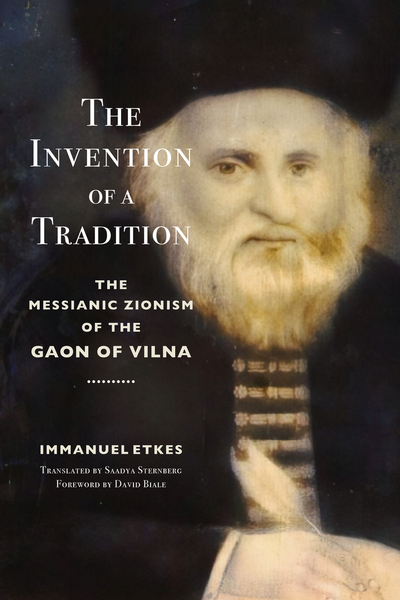
October 2023
234 pages.
$65.00
Hardcover ISBN: 9781503634534
Ebook ISBN: 9781503637092
The Gaon of Vilna was the foremost intellectual leader of non-Hasidic Jewry in eighteenth-century Europe; his legacy is claimed by religious Jews, both Zionist and not. In the mid-twentieth century, Shlomo Zalman Rivlin wrote several books advancing the myth that the Gaon was an early progenitor of Zionism. Following the 1967 War in Israel, messianic sentiments spread in some circles of the national-religious public in Israel, who embraced this myth and made it a central component of the historical narrative they advanced. For those who identified with the religious Zionist enterprise, the myth of the Gaon and his disciples as the first Zionists was seen as proof of the righteousness of their path.
In this book, Israeli scholar Immanuel Etkes explores how what he calls the "Rivlinian myth" took hold, and demonstrates that it has no basis in historical reality. Etkes argues that proponents of the Rivlinian myth seek to blur the distinction between Zionism as a modern national movement and traditional messianic phenomenon—a distinction that underlies many of the central conflicts of contemporary Israeli politics. As historian David Biale suggests in his brief foreword to this English translation, "what is at stake here is not only historical truth but also the very identity of Zionism as a nationalist movement."
About the author
Immanuel Etkes is Professor Emeritus of the History of the Jewish People at the Hebrew University of Jerusalem.
"Immanuel Etkes's meticulously learned study demolishes the revisionist history of the origins of Zionism. Not only has Etkes set the historical record straight, but he has also exposed the falsifications of history that serve the pernicious political turn towards messianic and antidemocratic religious fundamentalism in Israel today. An exceptional work of sober historical scholarship that makes a real difference in our understanding of the contemporary world."
—Allan Nadler, Drew University
"In concise chapters Etkes reviews and rejects direct personal involvement of the Vilna Gaon in the life of the first Zionist settlers. He persuasively argues that valid letters and literature suggest that the Gaon's teaching, not direct involvement, inspired return to Zion among his disciples and descendants.... Recommended."
—Z. Garber, CHOICE
"Are [Hazon Zion and Kol haTor] these works authored by students of the Gaon? Or were they written by Shlomo Zalman Rivlin, a 20th-century Jerusalemite, who attributed them to the Gaon's students?
"In this important book, ... Immanuel Etkes puts the debate to rest. He meticulously documents the supposed evidence of the earlier authorship and discovers that none of it holds water."
—Yoel Finkelman, Association of Jewish Libraries News and Reviews
"Mr. Etkes's book is a painstaking demolition of Shlomo Zalman Rivlin's messianic Zionism."
—Carl Rollyson, New York Sun